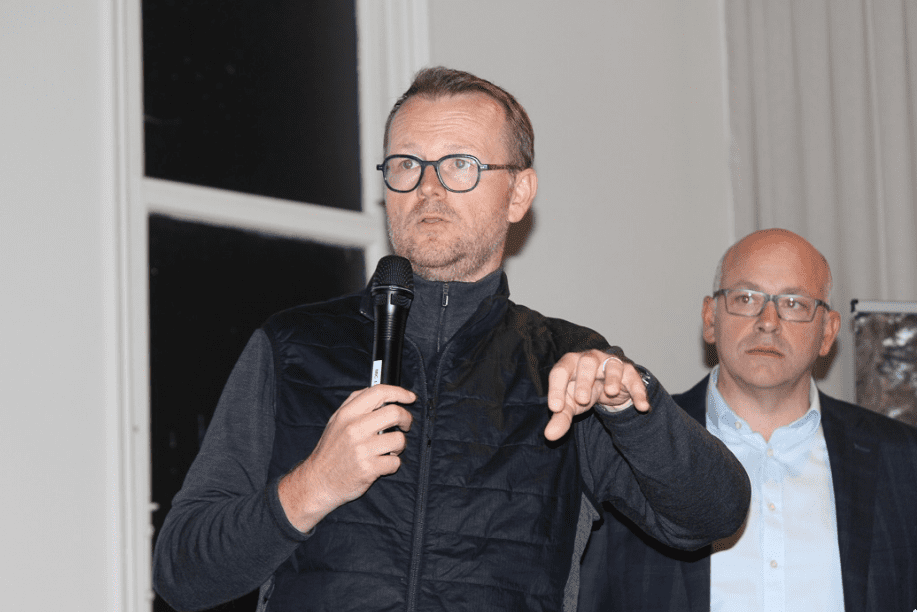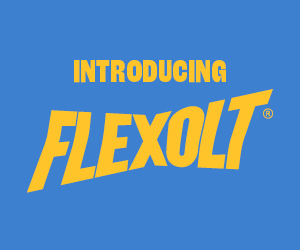
icebreaker and Smartwool Global brand president Jan Van Mossevelde in Bendigo, watched by NZM general manager global supply Matt Hand.
AUSTRALIAN and New Zealand Merino wool producers have been urged to adopt regenerative practices to survive in a carbon conscious economy, by icebreaker and Smartwool Global brand president Jan Van Mossevelde.
At an event hosted by The New Zealand Merino Company’s ethical wool brand ZQ Merino, during the Australian Sheep and Wool Show, Mr Van Mossevelde said wool’s Achilles heel is its carbon footprint.
He said that based on the current scientific tools to measure climate impact there are still those who may be led to believe that a 100 percent synthetic T-shirt is somehow superior to an equivalent wool variant.
New Zealand and Australian Merino wool growers supply certified ZQ Merino wool to icebreaker and Smartwool through their marketer, The New Zealand Merino Company. In 2021, NZM with Allbirds, Smartwool and icebreaker launched what they described as the world’s first regenerative wool platform ZQRX.
The NZ Merino website describes ZQRX wool growers as interacting with the natural world on the consumer’s behalf each day at a grassroots level to restore waterways, protect native species, measure carbon and enhance local communities. By identifying existing and future market challenges, NZM says ZQRX creates opportunities for wool growers through enabling brands and markets to recognise the great things wool growers do every day in support of constant improvement.
Mr Van Mossevelde said using current available science, the carbon footprint of a synthetic T-shirt is reportedly lower than that of a woollen T-shirt.
 “If it is only the carbon metric used to define icebreaker’s climate goals “then we’ve got the world against us,” he said.
“If it is only the carbon metric used to define icebreaker’s climate goals “then we’ve got the world against us,” he said.
“That’s why I say our carbon footprint is our Achille’s heel, because it is the only reason that I can personally think of right now why a consumer would say ‘I’m not in it, this (wool) is not for me.
“Again, through recognizing the challenges, we create opportunities,” Mr Van Mossevelde said.
“So we need to fix this, not because we believe it’s all about the birds and the bees, which it is also, but because protecting the climate goes beyond carbon emissions and needs to include biodiversity as well to deliver against the betterment of people and the planet.
“But also if we don’t fix it we might be out of business in ten years from now, because just like what happened to fur, right,” he said.
“The world at large went against fur, and fur is more or less gone – I don’t want that to happen to wool.
“They say strategy is a choice, you can go left, you can go right, both are good options … going straight in a one way street is not strategic, that’s just going with the flow, like a flock.”
“Going ZQRX is not a choice, we have to,” Mr Van Mossevelde said.
“We are absolutely passionate about our methane and carbon footprint, but we need to find a way to get there, we can’t just change everything overnight.
“That’s why we are so proud to be founding partners of the ZQRX program and, as a result, many of the icebreaker and Smartwool growers are already well on their way towards a regenerative future.”
Mr Van Mossevelde said icebreaker has stores in Australia, New Zealand, the United States and Canada, but none in Europe, and he explained why icebreaker has focused on online marketing rather than opening more stores around the world.
He said the current retail environment has been “extremely dicey”, especially with COVID, with stores closing while rents were still due.
“Icebreaker has had a consistent cautious approach to make sure that the brand wasn’t over-extending into physical retail.
“So, it’s no surprise that markets have been unpredictable, but through the careful management of costly physical retail channels, we (icebreaker and Smartwool) continue to achieve our growth objectives,” he added after the event.
“As global market leaders across natural fibre and activewear sectors, the opportunity for significant growth is very real as we strategically build consumer awareness around our brands and perhaps the most compelling natural fibre on the globe, wool.”



Whilst I agree with the adoption of regenerative agriculture, I see challenges until it is clearly defined and it has been scientifically evaluated. I understand a trial has been established in New Zealand, but this needs to happen in Australia in different climatic regions. It needs very clear guidelines as to what’s in and what’s not.
I do not consent to this carbon danger agenda going around. Without the carbon nothing would be alive on this planet. I ask them to please explain why and how they keep pressing this BS when we all know anything living requires carbon to exist. They cannot? Then go away and let the globe continue being green. Thank you.
““We are absolutely passionate about our methane and carbon footprint, but we need to find a way to get there, we can’t just change everything overnight.”
The methane emissions from sheep is a flawed argument, because a piece of grass that decays in the ground releases the same amount of methane as if it is eaten by a sheep or cow.
Animals are part of the carbon cycle, no new ‘carbon’ is added to the atmosphere.
Methane blocks outgoing infrared radiation at a wavelength frequency of four microns. This frequency is already fully absorbed by water vapor in the atmosphere. If animals added more methane to the atmosphere, it would make no difference to the climate.
Please do not let our wool industry be damaged by junk science.
John
With the current prices being paid for medium Merino wool, it is hard to see a long-term future for the fibre.
Negative thinking will produce a negative result. Use current situation as an opposite.